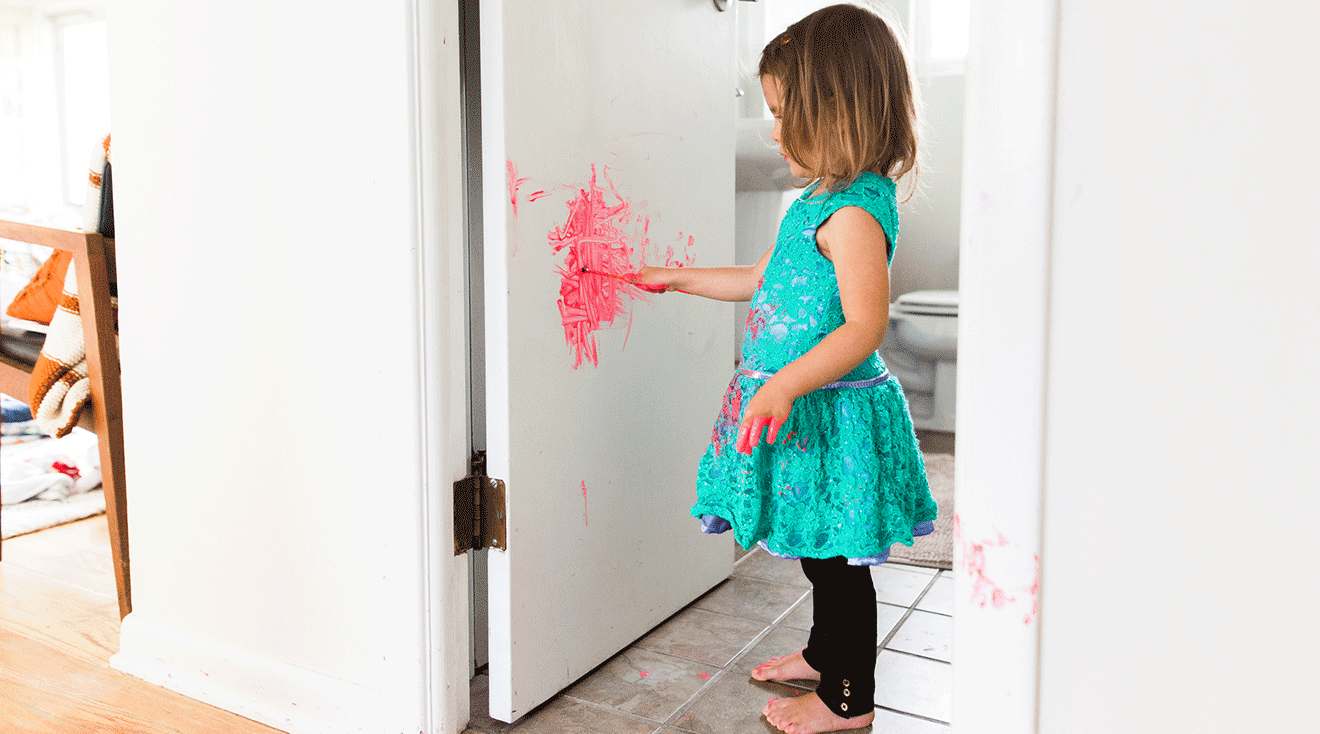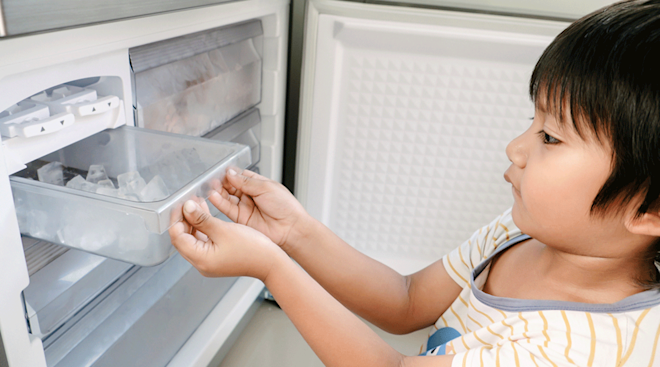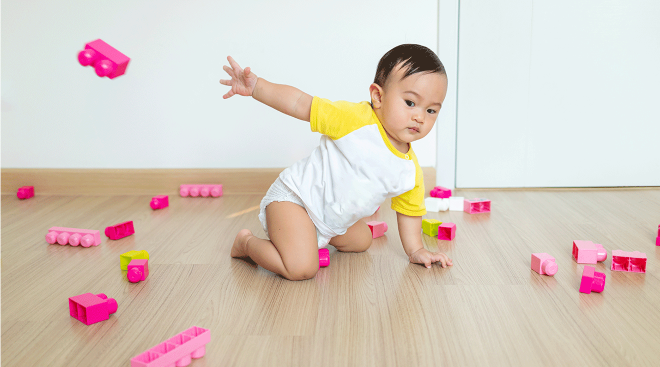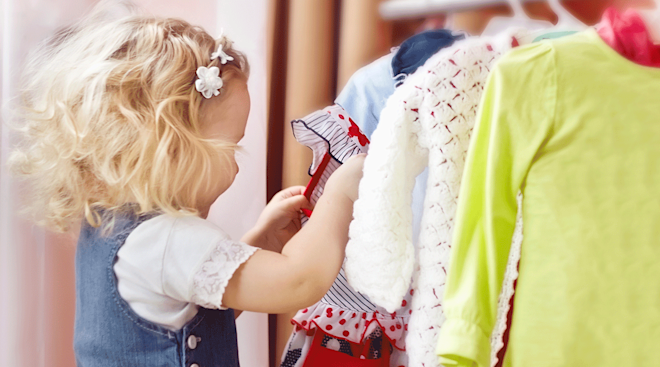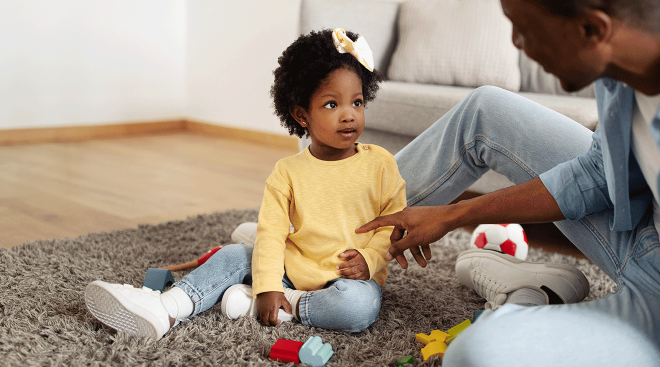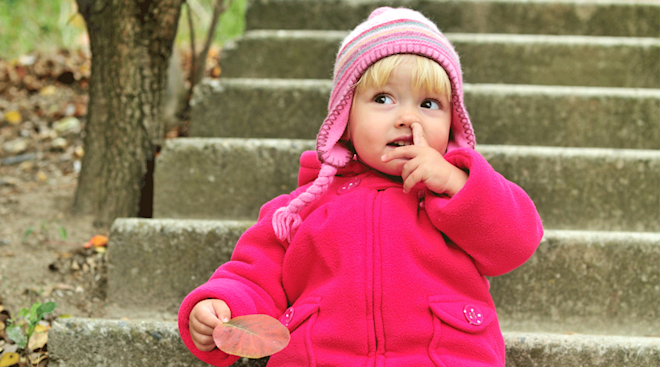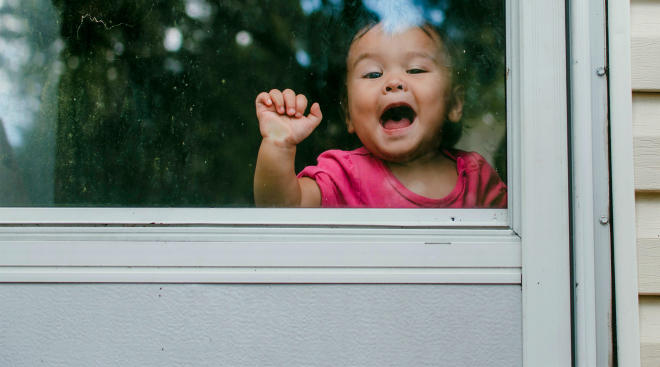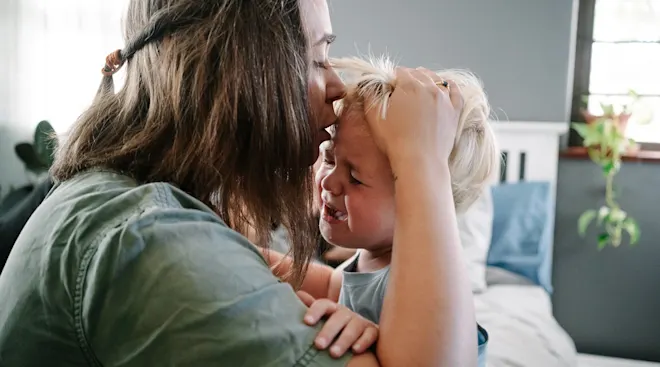Toddler Discipline: Why Toddlers Act Out—and What You Can Do About It
Most parents who’ve reached the toddler stage with their little ones will agree—it’s hard. Your tiny human is bursting with personality and experience a wide range of emotions, but they’re working with a limited vocabulary and can’t always articulate what they’re feeling. Combine this with the fact that it’s developmentally appropriate for them to begin to test boundaries and demonstrate defiance when they’re told “no,” and you no doubt have a very weary parent.
Still, a caregiver’s job is to teach their child right from wrong, so when a toddler acts out, it’s important to push back with effective discipline. But what exactly does this look like, particularly in the age of gentle parenting? Read on for tips and expert intel.
When you think about negative toddler behaviors, your mind might instantly go to a tantrum, since this intense display of emotions is common among tots. The American Academy of Pediatrics (AAP) says that tantrums will likely increase in frequency and possibly intensity throughout the toddler years. Suffice it to say, there may be whining, crying, kicking, hitting and yelling, among other behaviors. “Throwing food, hitting, biting and refusing a diaper change are all behaviors that we, as parents, find challenging, but they’re incredibly typical forms of toddler communication,” says Claire Goss, senior manager of learning and development at Bright Horizons, a nationwide childcare provider.
So what causes these outbursts? “When we’re talking about toddlers [‘acting out’], they’re more or less struggling with communication and could be testing the waters of what is right or wrong, and what will be accepted or not,” explains Jeff Yoo, LMFT, a marriage and family therapist at Moment of Clarity Mental Health Center in Santa Ana, California. Moreover, when a child bites a playmate or throws a bowl of fruit on the floor, they’re looking for attention and hoping to elicit a response, says Goss. “Behavior is communication—a child’s way of expressing emotion or need.”
Over time, you might be able to identify some triggers that send your child into a tailspin. Goss and Yoo, say that common causes for outbursts include:
- Boredom
- An uncomfortable environment (i.e. too hot, too cold, needing a diaper change, tight clothes)
- Fear or anxiety
- Fatigue
- Feelings of sadness, frustration or anger
- Hunger
- Confusion from a lack of knowledge or understanding
- Sudden change in routine
- Sensory overload
Finally, toddlers may act out in a certain way simply because it’s a behavior that worked previously.
You’ll want to model the behavior you expect from your child from the get go. But with babies, discipline is primarily about keeping them safe. As they move into the toddler years, they’ll begin to understand what’s happening around them and purposely test boundaries. You should continue to model behavior and, of course, intervene when there’s a potential threat, but start to build on these strategies and establish some expectations.
All this to say, there’s no magic time to start disciplining a child. It’s a progression that starts with love and respect. “All strategies are more effective when there’s a warm, nurturing relationship at the foundation,” says Goss.
It’s important to distinguish discipline from punishment, says Yoo. “Discipline is educational.” Goss echoes this sentiment: “Instead of thinking of yourself as a disciplinarian, think of yourself as a mentor or guide."
With this in mind, it’s helpful to keep things in perspective—because sometimes you’re going to have to pick your battles. Before intervening, assess how serious a given situation is (i.e. is your child in immediate danger—or did they dump a small cup of Cheerios on the floor?). Also consider your mental state (i.e. are you running low on patience, or are you able to model good behavior yourself?).
Once you feel that you’re ready to approach discipline with this frame of mind, here are some age-appropriate tips to keep top of mind:
- Use redirection. After you’ve intervened to stop a problematic behavior, the AAP suggests redirecting your child’s attention to a different activity. An example of this could be firmly telling your child not to jump on the sofa, and then walking them over to their toys to help them shift focus to something else.
- Consider their attention span. When disciplining your toddler, Yoo recommends keeping things brief. “[A toddler’s] attention span is very short—only seconds—then they’re off to another thought or action.” Since you have such a short window to address the situation, he advises parents to “[use] brief instructions—sentences such as ‘ouch, no hair pulling, that hurts Mommy.’”
- Act in the moment. When your toddler acts out, it’s important to stop what you’re doing and intervene in that moment, even if it’s not an ideal time. If you wait too long, your child may not even remember what you’re disciplining them for. If you’re out, don’t wait until you get home to address the situation because the moment will have passed.
- Try positive reinforcement. Since toddlers often act out as a way to get attention, praising good behaviors when you see them can reinforce positive behaviors, notes University of Rochester Medical Center. Over time, your tot will learn that they get more (and better) attention when they’re following the rules and respecting boundaries.
- Validate their feelings. “Practice acknowledging [your child’s] big feelings while calmly and firmly setting a limit or expectation,” Goss suggests. For example, when they’re screaming because playtime is over, and it’s time to start the bedtime routine, say something like, “I know it’s hard to stop playing when you’re having so much fun; I understand why you’re sad. But it is bedtime, so we need to start getting you ready.”
- Instill logical consequences. Depending on the situation, you can gently implement logical consequences. For example, if your toddler and a friend are fighting over a toy, put the toy away for the day. This is a direct, logical consequence of negative behavior.
- Manage your tone and make eye contact. Practice actively listening with your child, even when they’re acting out. “Show sincere communication” with “direct eye contact,” suggests Yoo, adding that you’ll want to maintain a calm tone. This is another way to model the behavior you’d like to eventually see.
- Turn to a time-out. In some cases, it’s best to remove your child from the situation with a time-out or a retreat to the calm down corner . Pushing this veritable pause button can help them take a beat to regulate their emotions. Just be sure to keep the duration of the time-out appropriate for your child’s age. The AAP suggests one minute for each year of your child’s life (i.e. one minute for a one-year-old; two minutes for a 2-year-old, etc.).
Finally, no matter what toddler discipline strategy you choose, Yoo urges parents to “avoid harsh words, name-calling, hitting, yelling or threatening,” as these tactics “are trauma-based attempts of forcing your will onto the toddler.” Since children learn and mirror behaviors from their parents, this not only hurts them emotionally, but it teaches them that it’s okay to treat others in this way.
There’s no denying that the toddler years are tough. Parental patience and grace are essential to surviving this phase. When your tot’s behaviors start to wear on you, Goss suggests flipping your thinking from “this behavior is being done to me” to “this is how my child communicates with me.’” She adds a reminder that your little one is going through big developmental changes, and these challenging situations present an opportunity for you to support their development. In the meantime, you’ll have some tools to help them learn and grow—one behavior at a time.
Please note: The Bump and the materials and information it contains are not intended to, and do not constitute, medical or other health advice or diagnosis and should not be used as such. You should always consult with a qualified physician or health professional about your specific circumstances.
Plus, more from The Bump:
Claire Goss is the senior manager of learning and development at Bright Horizons. She earned her bachelor of arts in psychology from Bates College in 2002 and her master’s degree in child development and family studies from Tufts University.
Jeff Yoo, LMFT, is a licensed marriage and family therapist at Moment of Clarity Mental Health Center in Santa Ana, California. Jeff received his master of arts in marriage and family therapy from Hope International University in 2019 and his bachelor’s degree in business economics from the University of California Irvine in 2009.
Healthy Children (American Academy of Pediatrics), What’s the Best Way to Discipline My Child?, November 2018
University of Rochester Medical Center, Disciplining Your Child at Any Age
Healthy Children (American Academy of Pediatrics), How to Give a Time-Out, November 2018
Learn how we ensure the accuracy of our content through our editorial and medical review process.
Navigate forward to interact with the calendar and select a date. Press the question mark key to get the keyboard shortcuts for changing dates.

































